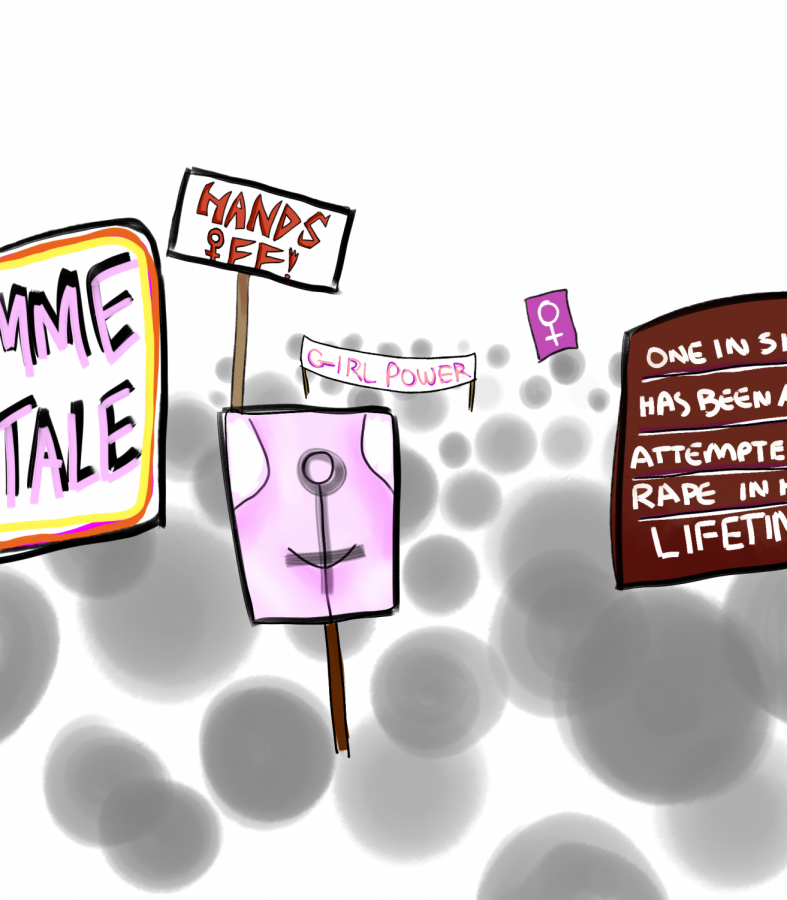I’m a bad feminist
When I was 14, my mother and I went to the first women’s march on Jan. 21, 2016. It was the day after Trump was inaugurated, and like many Americans, I was raw and confused and most of all scared for what the future would bring.
But marching with a sea of empowered women, I felt anchored by their strength and their hope.
I decided in the seventh grade that I was going to be a feminist when I started realizing what sexism and oppression is and how it affected me.
I read all that I could and watched a bunch of documentaries, and I absorbed the history of the oppression against woman-kind like a sponge.
I memorized names of prophetic activists who propelled the women’s rights movement forward: Susan B. Anthony, Sojourner Truth, Gloria Steinem, Angela Davis, Ruth Bader Ginsburg and more.
I let these women’s stories inspire me to keep searching for answers and to teach me resiliency in the face of hardship.
But, no matter much I look up to these women, I realize that they weren’t perfect.
The first ever feminist movement in American history developed in pre-civil war America, a time where women were questioning their role in society for the first time.
They coined the “Cult of Domesticity”, which glorifies women’s roles as homemakers, and although this was a revolutionary sense of empowerment at the time, these women still shamed other women who were daring enough to leave the house and seek work.
The suffragettes were an exclusive group of primarily wealthy white women who had the privilege of being able to speak out and often dismissed those with a skin color different to theirs.
Second wave feminists purposely silenced the narratives of women of color because they thought that their progress would be halted if the civil rights and feminist movements combined.
My point in all this is that with progress comes a lot of upheavals and yes, some regression. Every movement has its weaknesses — every person has their weaknesses.
And I am included in that. I am a bad feminist.
Yes, me. The girl who’s been a feminist since she understood what sexism is, the very same girl that has a framed picture of Ruth Bader Ginsburg on her desk and has read as many “feminist manifestos” as she can get her hands on.
I can say that on occasion I’ve said something nasty about a girl I didn’t know anything about. I’ve cut other women down when they’ve threatened me. I’ve judged and shamed girls who make choices I don’t agree with, even if it has absolutely nothing to do with me.
But I can also safely say that I am not alone. I am not the only female who has participated in this antagonizing behavior.
But why is that? Why does one woman tear down another for having the audacity to make different choices than she would?
Through careful consideration and much self-examination, I’ve come to the conclusion that women tear down other women not because we are mean or want to actually hurt someone; it’s usually from a place of jealousy.
But that begs the question: Why are we so jealous of each other?
I believe that society conditions women to be hyper-competitive with one another. From an evolutionary standpoint, this makes perfect sense; women need to find a suitable mate, and there are only so many of the best available, which directly creates competition between females for male attention. It’s survival of the fittest.
But nowadays, this Darwinistic ideology is harmful to womankind. I mean, look around! We can no longer afford to waste time and energy in petty arguments about who said what; we must stand together.
In the Me Too era, we can’t afford to judge other women. We must commend each and every woman for their bravery, their strength, their audacity to break social norms and propel womankind forward.
We must stand together, and acknowledge that the biting remarks about how short someone’s shorts are eroding the progress that we’ve made thus far.
All I ask is for women everywhere to examine their motives. Before you say something unkind about another woman, think twice. Is it because you have a good reason and you genuinely don’t like her? Or is it because her choices- which do not affect you in any way- make you uncomfortable?
That split second you spend thinking about your intention will make a big difference. I promise.
After all, we have a glass ceiling to shatter; there’s no time for bad feminism.
Your contribution will allow us to cover our annual website hosting costs, which are no longer covered by our district/school. If we do not meet our goal, we may lose this website and its archive of stories covering 2009-2023. Student journalists at Lane Tech use this archive to research past coverage of various topics and link to past stories to offer readers additional context for current stories. Thank you for supporting the award-winning reporting and writing of journalism students at Lane Tech College Prep!
Background information on why the school district no longer allows our school to cover web hosting costs:
https://lanetechchampion.org/12583/uncategorized/special-coverage-impact-of-soppa-on-cps-students-teachers/
https://lanetechchampion.org/11702/opinion/staff-editorial-cpss-soppa-policy-is-choking-students-learning-and-the-champion/

Maggie Nielsen and has been writing for the Warrior since the fall of 2017. She is the president of Podcast Club, a member of Printmaking Club and runs...

Mytam Vo is a current senior and is The Warrior's art editor. Apart from being the art editor, she enjoys making her own art and is learning how to play...








